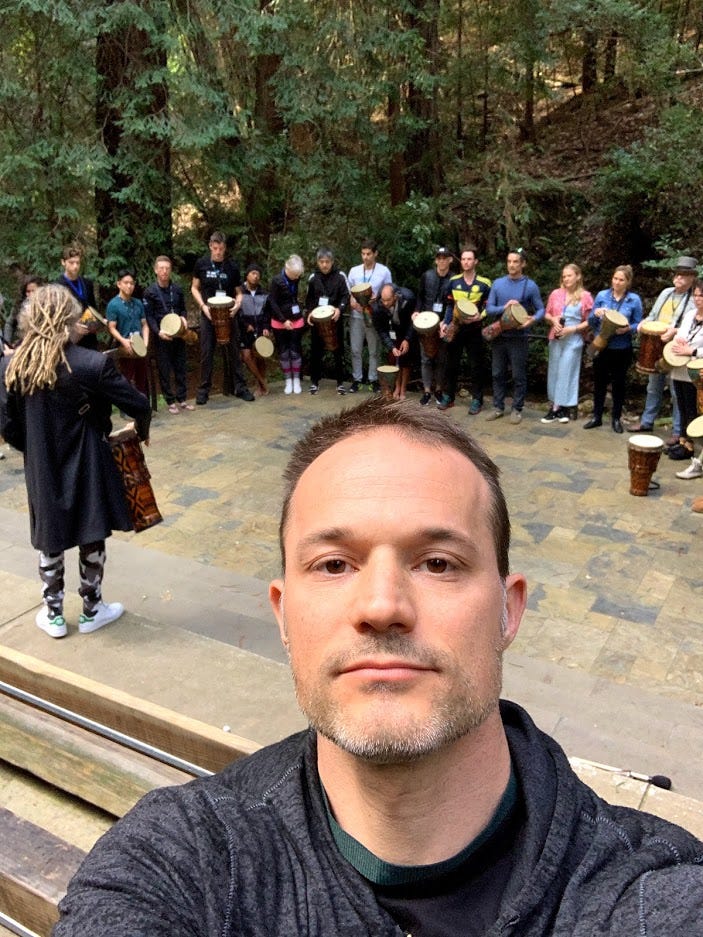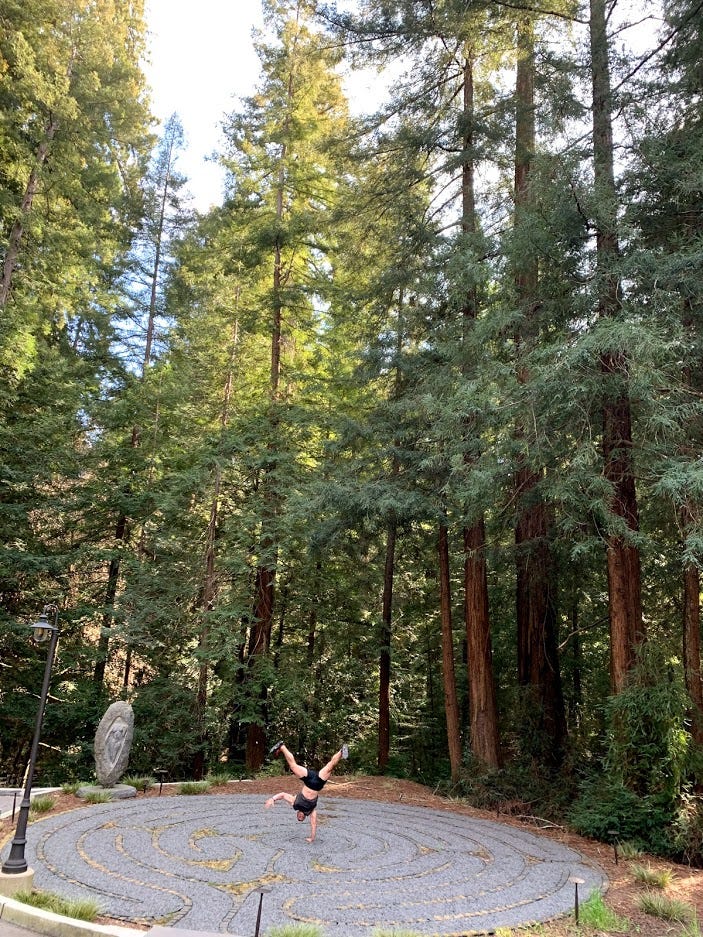🔥Welcome to volume 000016!🔥
I’m Christian Champ. This is ☯️The Middle Way Newsletter ☯️. It is a place where I write, explore, share, and invite you along for the journey.
🏁There Is No Finish Line 🏁
Last week I found myself immersed in learning, conversing and moving in a variety of ways. The Flow Genome Project hosted a week long event at 1440 Multiversity (yes, there is 1440 minutes in a day) in Santa Cruz, CA. The gathering included folks from all walks of life with the common denominator being they were awesome people, leaders, and lifelong learners with a love for finding flow. The venue puts you smack dab in the middle of the Redwood forest and includes a perfectly constructed environment.
Each day mixed the physical with the mental. Days included being in nature to deep dive learning sessions and robust discussions at meals facilitated by pressing questions. The event teed up quake like outcomes from a wide array of activities.
Every time I found myself in the throes of these beautiful moments in life, I feel the joy and happy sadness. Those moments when you want to bottle up what is happening so that you can feel it again. You want to bring it home with you and share it with the people you love. It is like watching your one-year old dance with you for the first time.
At the same time life moves on, we move on, and the event ends. We, though, continue becoming. We get to find more of those moments of joy and happy sadness. We get to hold on to them a little bit longer when they show up. If we do it right, we create even more of them. We figure out how to prime ourselves for flow and for the joy and happy sadness.
We dance, move, laugh and share the love. A week of exploration and learning ends, but we keep going. We keep growing. There is no finish. The journey never ends. We just keep becoming.

📓Articles to Read📓
In addition to being right, be kind by Ryan Holiday
Because you can’t reason people out of positions they didn’t reason themselves into. No one responds well to having their identity attacked. No argument made in bad faith—that the person on the other side is a moron or a dupe or a racist or a snowflake—is ever going to be received in good faith.
Reason is easy. Being clever is easy. Humiliating someone in the wrong is easy too. But putting yourself in their shoes, kindly nudging them to where they need to be, understanding that they have emotional and irrational beliefs just like you have emotional and irrational beliefs—that’s all much harder. So is not writing off other people. So is spending time working on the plank in your own eye than the splinter in theirs. We know we wouldn’t respond to someone talking to us that way, but we seem to think it’s okay to do it to other people.
The Great Fitness Scam by Brad Stullberg
Americans spend $264B on physical activity in a year and there is not much to show
Eat real food, move, move often and move some more!!!!
In addition, the health and fitness industry has become obsessed with complexity. Sometimes this is warranted, but often it’s not. One reason people make things complex is so they can sell them. It’s hard to monetize the basics, but come up with an intricate and sexy-sounding approach to something and people will pay for it. So why are so many of us willing to fork over cash for often unnecessary services? Perhaps because complexity is a way to avoid facing the reality that what really matters for health and fitness is simply showing up and doing the work. Not thinking about it or talking about it. Just doing it.
The more complex you make something, the easier it is to get excited about, talk about, and maybe even get started—buttheharder it is to stick with over the long haul. Complexity gives you excuses and ways out and endless options for switching things up all the time. Simplicity is different. You can’t hide behindsimplicity. You have to show up, day in and day out, and pound the stone.
What We Want Doesn’t Always Make Us Happy by Noah Smith
Figure out the things that make you happy and do them.
Don’t do things that you think make you happy that don’t make you happy.
Economists and other happiness researchers consistently find that longer commutes are associated with unhappiness. Yet people still pay quite a lot to live in far-flung exurbs. Economist Robert H. Frank has found that the larger houses that come with exurban life don’t compensate for the longer commute times in terms of happiness. House size and commute time aren’t the only factor in the choice of what neighborhood to live in, but this might be another case like Facebook where things that bring utility don’t bring happiness.
100 Little Ideas by Morgan Housel
A couple favorites:
Ringelmann Effect: Members of a group become lazier as the size of their group increases. Based on the assumption that “someone else is probably taking care of that.”
False-Consensus Effect: Overestimating how widely held your own beliefs are, caused by the difficulty of imagining the experiences of other people.
Poisoning the Well: Presenting irrelevant adverse information about someone in a way that makes everything else that person says seem untrustworthy. “Before you hear my opponent’s healthcare plan, let me remind you that he got a DUI in college.”
Declinism: Perpetually viewing society as in decline, because you’re afflicted by the Pollyanna Principle and you forget how much things sucked in the past.
Moral Luck: Praising someone for a good deed they didn’t have full control over. “Avoid calling heroes those who had no other choice.” – Taleb.
🎙️ Listen / Watch 📺
Part I - Hell Yeah or No - Future Thinkers with Derek Sivers
Hell yeah or no —> tend to say yes to too many things and get stuck doing average things vs. great things. We need the time energy and space to find the great things and do them. When younger without opportunities do more and create more lottery tickets.
What is really important and necessary?
Build your life around your values, but also experiment to see what happens. If you say your kid is more important than your phone, why are you on your phone vs. playing with your kid?
If learning is your top thing and you are living in a comfortable house for many years, are you really living your value? Try edges and extremes to test your values and if you are living them.
What experiments are you running? Tried solitude, tried minimalistic living, tried having stuff, tried being an extrovert and then an introvert.
Journals 1-3 hours a day and runs future potentials with his journey.
Remember that we change. We think we don’t but we do. Do you really want to just do more of the same? Are you stuck in a habit loop and don’t change as much as you can?
Is there too much freedom? What do you do if you can do anything? Where do you go if you can go anywhere and be anywhere?
Ask yourself what your values are? What thread has mad you happy
Happy, smart and useful —> is Sivers three threads. When all three are in alignment. Ikiga is like that. You think you came up with this stuff but its all already there. Stoicism was a practice for him before he realized it existed.
Eyeballs evolved in nature multiple times with different animals. Like ideas for humans and animals
Challenge yourself to see what you don’t need. Showing yourself you don’t need stuff is beautiful. Getting by without stuff is enlightening.
His only loyalty is dear friends and family. Not identify or any stuff.
Ego takes up energy. Has needs like validation.
Part II - How to Live - Future Thinkers with Derek Sivers
His favorite book is Sum: Forty Tales from the Afterlives by David Eagleman (the event I referenced at the beginning of the newsletter involved a reading from this book) which includes 40 answers to one question
Derek’s new book, How to Live, includes 25 chapters on how to live that each contradict each other
He likes directives… finding value in the seed vs. the tree
People asking what did he mean by that is more interesting to him than making it completely clear
Legacy idea leads to him sharing more thoughts and ideas
He writes, thinks and reads without watching things
Hell yeah is a tool for a certain time and situation. The isms are just tools for the right situation and should be challenged.
Mainly times he is doing things for the doing and not for the finish line
There are many paths, sometimes we need to switch up paths
Michael Pollan Explains Caffeine Addiction and Withdrawal to NPR
"Here's a drug we use every day. ... We never think about it as a drug or an addiction, but that's exactly what it is," Pollan says. "I thought, 'Why not explore that relationship?'"
It's beginning when you wake up. I mean, you haven't had coffee or tea since sometime the day before. ... All those people who tell you, "I'm not civil" [or] "I'm not fit for human conversation until I have a cup of coffee" — they're beginning to go through that withdrawal. They're starting to feel a little off — that muzziness is coming in. Maybe they have a headache. Maybe they're a little irritable. And then they have that cup of coffee, and the pleasure they're getting from it, I learned, is not simply the lift, the euphoric lift of the drug. It's the suppression of the symptoms of withdrawal. We go through that cycle.
📚 Books to Read or Listen to📚
Michael Pollan’s audible only “book” - Caffeine
A short listen on the power of caffeine, the most readily available psychoactive drug.
Stealing the seeds to move the IP to Europe
How shifting to coffee stopped a lot of drinking of alcohol and how effective workers were
Coffee leading to the enlightenment and more learning
Sleep researches all tend to AVOID coffee
💣Words of Wisdom💣
What I Talk About When I Talk About RunningHaruki Murakami and Philip Gabriel
The end of the race is just a temporary marker without much significance. It’s the same with our lives. Just because there’s an end doesn’t mean existence has meaning. An end point is simply set up as a temporary marker, or perhaps as an indirect metaphor for the fleeting nature of existence.
As my friend and mentor Parker Palmer, teaches, “Violence is what we do when we don’t know what to do with our suffering.” Violence to our planet, violence to our communities, and violence to ourselves are what we do when we refuse to look inward and work with the heartbreak of the everyday
I Will Teach You to Be RichRamit Sethi
People love to argue minor points, partially because they feel it absolves them from actually having to do anything
🙏Thanks for reading.🙏
What do you want to become more of? What are your flow triggers?
Any thoughts, comments or ideas to share, please reach out.
Namaste,
Christian




